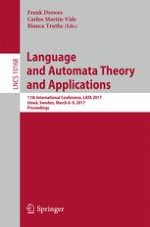2017 | OriginalPaper | Buchkapitel
The Strong, Weak, and Very Weak Finite Context and Kernel Properties
verfasst von : Makoto Kanazawa, Ryo Yoshinaka
Erschienen in: Language and Automata Theory and Applications
Aktivieren Sie unsere intelligente Suche, um passende Fachinhalte oder Patente zu finden.
Wählen Sie Textabschnitte aus um mit Künstlicher Intelligenz passenden Patente zu finden. powered by
Markieren Sie Textabschnitte, um KI-gestützt weitere passende Inhalte zu finden. powered by
